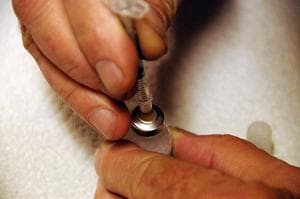Advertisement
Research May Point Way To Fewer Insulin Injections For Diabetics

Insulin injections and other medications are a part of daily life for patients with diabetes. But Boston researchers may have found a way to eventually replace or significantly lessen the need for these diabetes treatments.
A Children’s Hospital Boston study, published in Nature Medicine here, found that activating proteins called XBP-1s in the liver lowered blood sugar in mice with Type 1 and Type 2 diabetes without causing hypoglycemia as other treatments often do. Hypoglycemia, or low blood sugar, can lead to complications including anxiety, trembling, rapid heart rate, or in severe cases, seizures or coma.
Dr. Umut Ozcan, who led the study, said activating the protein doesn’t just lower blood sugar, but also keeps it balanced.
“Their blood glucose levels are maintained at normal levels, which is very exciting for us,” Ozcan said. "It doesn’t cause hypoglycemia, which is one of the side effects, or undesired effects, in insulin therapy and some other therapies.”
Researchers are looking for practical ways to activate the protein in humans, Ozcan said.
Activating XBP-1s lowers blood sugar in two ways. First, it increases insulin sensitivity, which could allow people with Type 2 diabetes to process the insulin in their bodies. Second, it directly lowers liver glucose output by degrading another protein in the liver. This function does not require insulin and could help people with Type 1 diabetes to normalize their blood sugar levels.
Ozcan said patients with Type 1 diabetes would still need to take some insulin for other tissues in their bodies to function properly. But the treatment would significantly decrease the need for injections, he said. And for Type 2 diabetes, this could turn out to be the closest we’ve come to a cure, he said.
Ozcan said one concern with the treatment is that since insulin resistance can give us longer lives, increasing our insulin sensitivity too much can shorten our life spans. But practically, the XBP-1 would not cause a problem, Ozcan said. The treatment increases insulin sensitivity moderately, but works mainly by decreasing glucose output from the liver.
This program aired on February 16, 2011. The audio for this program is not available.